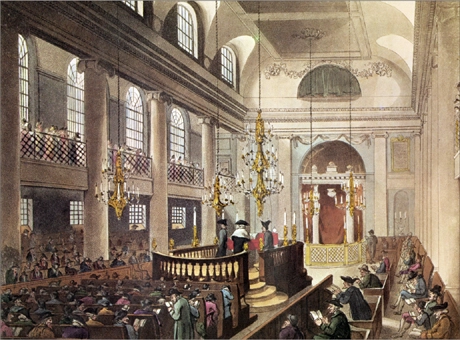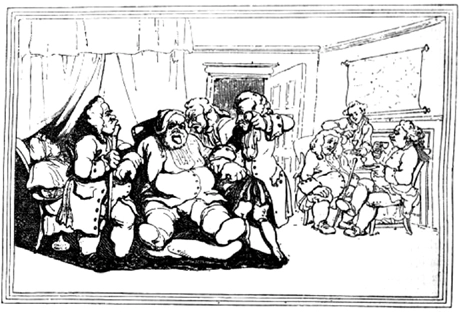“My dearest creature,” cried Isabella, to whom the duty of friendship immediately called her before she could get into the carriage, “you have been at least three hours getting ready. I was afraid you were ill. What a delightful ball we had last night. I have a thousand things to say to you; but make haste and get in, for I long to be off.”
Catherine followed her orders and turned away, but not too soon to hear her friend exclaim aloud to James, “What a sweet girl she is! I quite doat on her.”
“You will not be frightened, Miss Morland,” said Thorpe, as he handed her in, “if my horse should dance about a little at first setting off. He will, most likely, give a plunge or two, and perhaps take the rest13 for a minute; but he will soon know his master. He is full of spirits,14 playful as can be, but there is no vice in him.”
Catherine did not think the portrait a very inviting one, but it was too late to retreat, and she was too young to own15 herself frightened; so, resigning herself to her fate, and trusting to the animal’s boasted knowledge of its owner, she sat peaceably down, and saw Thorpe sit down by her. Every thing being then arranged, the servant who stood at the horse’s head was bid in an important16 voice “to let him go,”17 and off they went in the quietest manner imaginable, without a plunge or a caper, or any thing like one. Catherine, delighted at so happy an escape, spoke her pleasure aloud with grateful surprise; and her companion immediately made the matter perfectly simple by assuring her that it was entirely owing to the peculiarly judicious manner in which he had then held the reins, and the singular discernment and dexterity with which he had directed his whip. Catherine, though she could not help wondering that with such perfect command of his horse, he should think it necessary to alarm her with a relation of its tricks, congratulated herself sincerely on being under the care of so excellent a coachman; and perceiving that the animal continued to go on in the same quiet manner, without shewing the smallest propensity towards any unpleasant vivacity, and (considering its inevitable pace was ten miles an hour)18 by no means alarmingly fast, gave herself up to all the enjoyment of air and exercise of the most invigorating kind, in a fine mild day of February, with the consciousness of safety. A silence of several minutes succeeded their first short dialogue;—it was broken by Thorpe’s saying very abruptly, “Old Allen is as rich as a Jew19—is not he?” Catherine did not understand him—and he repeated his question, adding in explanation, “Old Allen, the man you are with.”
“Oh! Mr. Allen, you mean.20 Yes, I believe, he is very rich.”
“And no children at all?”
“No—not any.”
“A famous thing for his next heirs. He is your godfather, is not he?”
“My godfather!—no.”
“But you are always very much with them.”
“Yes, very much.”

The principal London synagogue. The picture is from a popular book of the time showing the one hundred leading landmarks in London. The synagogue’s inclusion, and the completely neutral description of it (no different in style from those for London churches), testifies to the increasing acceptance of Jews in England.
[From Fiona St. Aubyn, Ackermann’s Illustrated London, illustrations by Augustus Pugin and Thomas Rowlandson (Ware, 1985), p. 81]
[List of Illustrations]
“Aye, that is what I meant.21 He seems a good kind of old fellow enough, and has lived very well in his time, I dare say; he is not gouty for nothing.22 Does he drink his bottle a-day now?”23
“His bottle a-day!—no. Why should you think of such a thing? He is a very temperate man, and you could not fancy him in liquor last night?”
“Lord help you!24—You women are always thinking of men’s being in liquor. Why you do not suppose a man is overset25 by a bottle? I am sure of this—that if every body was to drink their bottle a-day, there would not be half the disorders in the world there are now. It would be a famous good thing for us all.”
“I cannot believe it.”
“Oh! lord, it would be the saving of thousands. There is not the hundredth part of the wine consumed in this kingdom, that there ought to be. Our foggy climate wants help.”26
“And yet I have heard that there is a great deal of wine drank in Oxford.”27

A visitor to Bath with gout.
[From Joseph Grego, Rowlandson the Caricaturist, Vol. I (London, 1880), p. 334]
[List of Illustrations]
“Oxford! There is no drinking at Oxford now, I assure you. Nobody drinks there. You would hardly meet with a man who goes beyond his four pints at the utmost. Now, for instance, it was reckoned a remarkable thing at the last party in my rooms, that upon an average we cleared about five pints a head. It was looked upon as something out of the common way. Mine is famous good stuff to be sure. You would not often meet with any thing like it in Oxford—and that may account for it. But this will just give you a notion of the general rate of drinking there.”
“Yes, it does give a notion,” said Catherine, warmly, “and that is, that you all drink a great deal more wine than I thought you did.
1 comment